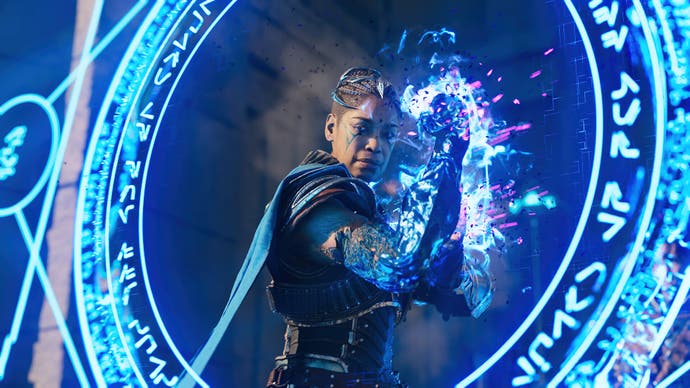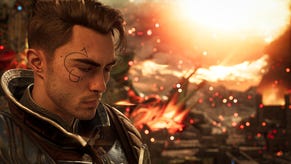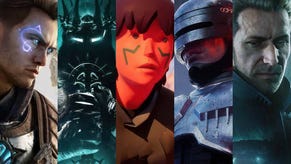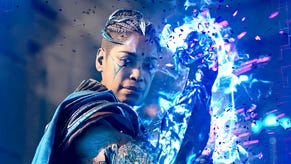Immortals of Aveum review - pioneering new heights of naffness
Jak and Cackster.
Early on, Immortals of Aveum gives the whole game away. During one of many, many expository scenes with General Kirkhan - played here by a committed Gina Torres, of Destiny 2 and Suits fame, who is if nothing else wonderfully game - you, the hero Jak, are told that you're special. This is because you're a Triarch, which is a kind of Magnus (Immortals of Aveum loves a proper noun, brace yourself), only better: while a regular magic wielder must commit themselves to one of three "colours" of magic - red, green, blue - a Triarch can tap into all three.
The downside, Kirkhan tells you: you'll never be as strong in any of them as a regular Magnus is to their committed colour. It's hard to think of a game that sums up one of its biggest problems so succinctly. Amongst the various issues Immortals of Aveum has, one of the biggest is its central concept of being free to switch between its three schools - the freedom is a mirage. You have to switch, constantly, to defeat its very rigidly coded enemies and solve its rudimentary tricolour puzzles. And so the whole three-magics, three-weapons, three-skill trees thing is all a bit moot - you're locked in from the off as a master of none.
Sadly, that's also emblematic of Immortals of Aveum as a game. This is the everygame taken to another dimension. You are a wise-cracking kid with a maverick attitude thrown onto the frontline battlefield, you're also a sort-of chosen one - special Triarch and all that - and you have a three-pronged skill tree with exciting upgrades like "+5 percent critical hit damage" and, thank god, the ability to craft, collect, upgrade, and dismantle loot, despite this really feeling like it makes absolutely no difference whatsoever to your efforts on the field.
If it sounds like I'm flying through this stuff, it's because I really am. Explaining Immortals of Aveum feels a lot like playing it, in that it's something I've done dozens and dozens of times before and all of those other times in at least slightly more interesting ways. It does have one sort-of twist, mind, which is its three-magics approach. This doesn't really work, as I've already alluded to, but still. It is new and it is genuinely almost interesting.
In Immortals of Aveum you traverse the world right-arm raised, your entire limb permanently extended out in front of you like a frozen shoulder turned first-person shooter's gun. Aveum is developed by the newly-formed Ascendant Studios, and it's led by people with Call of Duty pedigree. In that sense you can feel it: shooting is your primary, almost only way to interact with Aveum's world - you shoot chests to smash them open, and shoot little coloured shapes to solve puzzles, and shoot little coloured whisps for a little burst of something called something like Arcanium, which is XP but magic. From the off, you have three weapons - they're called spells but they're weapons - to shoot out of your gun-arm, and then within those three spells you can interchange your options like swapping one sidearm for another in the menu. So set your gun-arm to Red and you'll be using vaguely angry feeling weapons, like a shotgun or grenade launcher; Green, the colour of "life and… the opposite to life", is various forms of automatic weapon, from slow-charging mini-gun style projectiles to rapid-fire SMGs. Blue rhymes with pew-pew, and is therefore the colour of long-range pokey weapons, such as a DMR-alike and low fire-rate, high damage sniper equivalent (minus any kind of scope, mind).
Unfortunately the relative simplicity and gun-first mentality is really where the lessons from Call of Duty end, as there's a good argument to be made that more or less none of these weapons feel particularly great. All of them - really, all of them - have massive recoil, which is manageable in theory if playing with a mouse and a very tall mouse mat, but deeply unenjoyable with a controller. Several Green weapons seem to easily confuse themselves - if you tap the trigger rather than holding it, you'll fire off one projectile then sort of jam the gun, which happens in a way that, sans any kind of audio-visual cues, suggests this isn't an actual jamming mechanic but just an awkward, likely unintentional way the gun works.
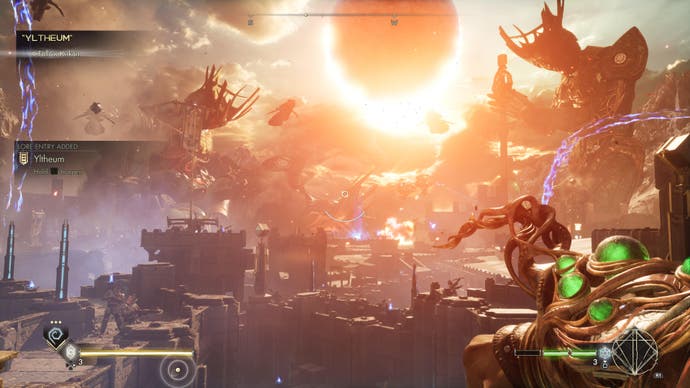
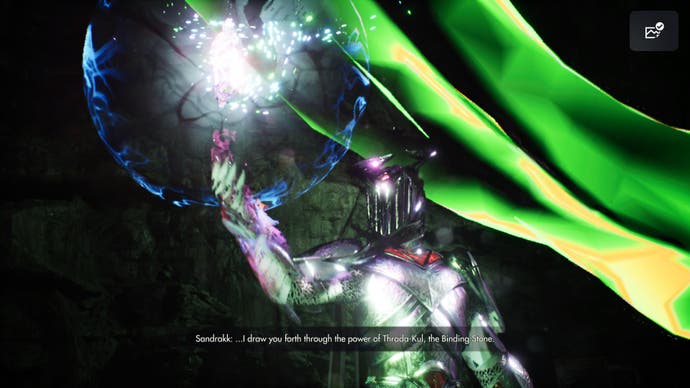
The shotgunny Red weapon is handy up close, but fills the screen with vast, chaotic visual effects that make it hard to see what you're actually shooting. In fact, that's really an issue for most of Aveum's weapons, certainly the Red and Green kind - if you're like me, after things ramp up a few levels in, you'll spend much of your time with this game squinting at vague, darting, sparkly shapes, like you're being assaulted by your own phosphenes, only it's also hard to tell if they're dealing damage to you or taking damage from you, or are in fact immune to your damage or - most likely - some combination of all of these things at once. Combine that with regular occasions where you'll seemingly clear a combat encounter, only for an enemy to spawn and blam one right into your back, or another punt you hundreds of yards off a ledge, or leap right up into your face and get you all turned around, and disorientation almost feels like an actual strategy of theirs.
The Red weapons, though, also touch on arguably the biggest problem with Aveum's combat - besides not really being able to see much of it. Here in the post-Titanfall, post-Doom 2016, post-Fortnite world the modern shooter has changed dramatically. This is now a genre of positioning, movement and fluidity as much as it's one of whack-a-mole and on-trigger satisfaction.
This is where old Red comes in: Red weapons are good for clustered, typically close-range enemies, and despite a very underwhelming, slow-recharge dash, you do have some form of gap-closer in your left-trigger abilities, like a kind of grappling whip that yanks distant grunts towards you or you to them. But! Many enemies are resistant in some form, or at least dealt with much more efficiently with other colours. Blue attacks shred shields for instance, while Green prevents fast-regeneration of health.
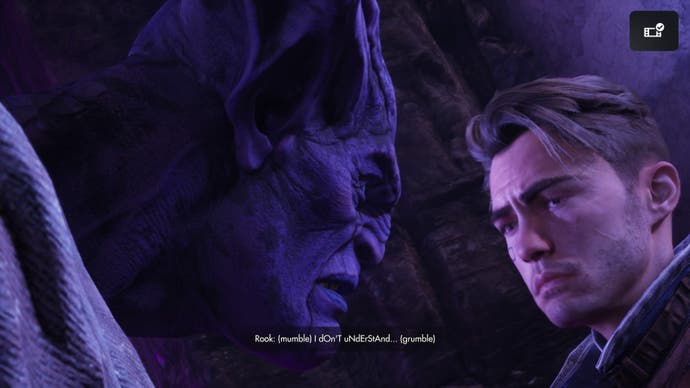
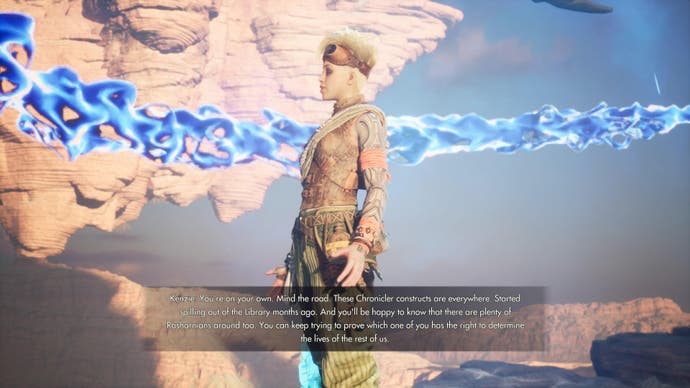
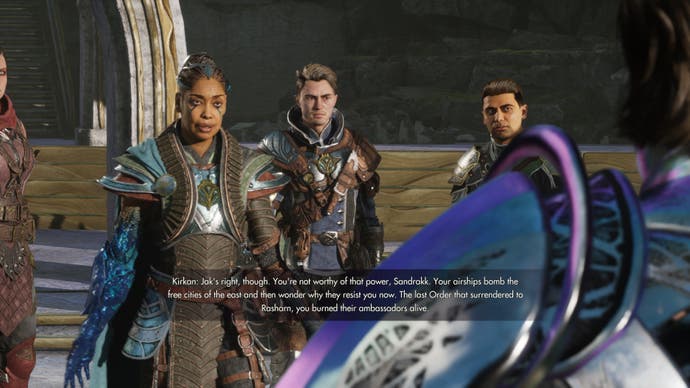
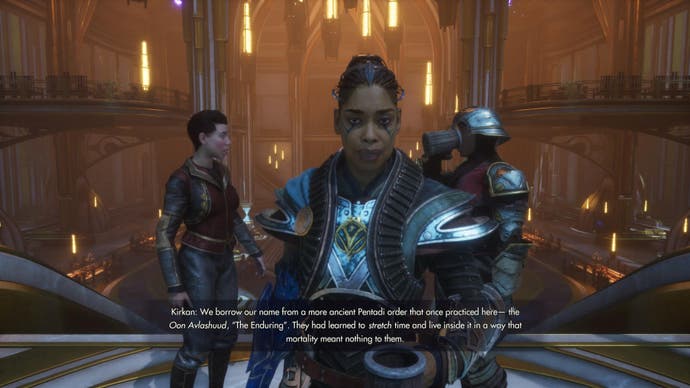
Just as you'll build a bit of Red-mist rhythm then, maybe stacking a nice buff you unlocked in that skill tree that increases Red damage with Red-delivered kills, you'll have to swap out to Green anyway because oop, that big lad's regenerating infinitely through your attacks, or that other one's practically immune thanks to his big blue shield. Instead of specialising then and using your movement to create situations where your speciality can work - despite some almost comically fast sprint speed and the ability to double-jump and float, Destiny Warlock-style, around the battlefield - you'll often be best off just sitting still in the middle of a large open battle arena and mechanically rotating between attack colours, holding up a shield with one hand and playing colour-coded whack-a-mole with the other.
Being brutal, even if that weren't incentivised - admittedly at times that also doesn't work, because Immortals of Aveum's enemies do have an alarming ability to randomly deliver a one-shot from off screen - your movement abilities don't really dovetail, evolve, or interact in interesting ways. You can jump, run and very infrequently dash, and that's the extent of it. Take something like Metal: Hellsinger's locomotion but remove all the ingenious rhythm from it - as in, the best bit - and you'll get something quite similar to Immortals of Aveum.
Between these regular, draining bouts of combat you'll need to smash an immeasurable number of boxes - box-smashing on an industrial, factory-farm-full-of-Crash Bandicoots scale. These crates are everywhere and they deliver gold or Red/Blue/Green essence (for crafting! You love crafting, remember?!), or maybe a health not-potion or another round of magic skill… ammo? It's worth noting that alongside your arm-PG spell launcher you also have a small selection of medium-cooldown skills to use, which do some damage in exchange for obstructing even more of your vision with particle effects. There are also some other chests, which signify their status by being opened with a button press instead of a shotgun blast, and might contain more gold, or a marginally higher-level bit of loot (you love loot too!).
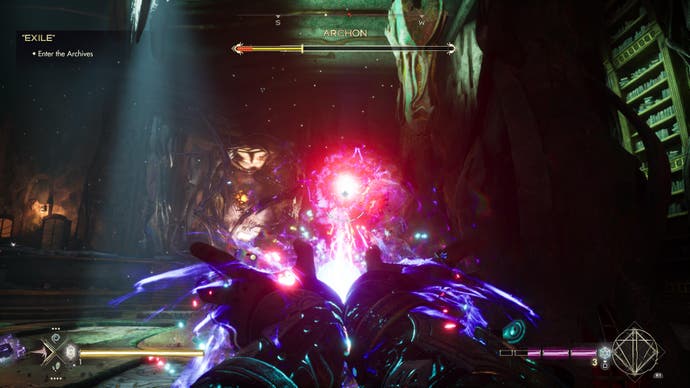
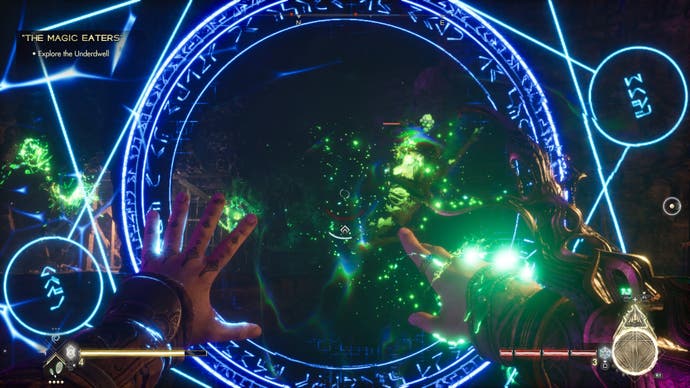
Between box-smashing and combat, you'll likely be solving environmental puzzles. These range from incredibly rudimentary tests of looking for a blue triangle and shooting it once with your blue gun, to the moderate challenge of looking for a blue triangle, a red square and a green circle, and shooting them once with a blue, red, and green gun, to some almost clever, but mostly annoying tests of finding these things in obscure places, or doing so while evading enemies, or using one of your tactical skills like throwing Limpets - a green blob that slows stuff and is actually very useful in combat - to slow a falling portcullis' return to closure.
Mercifully, even the most inane puzzles don't compare with certain other games' desire to prompt you with the old "maybe I should try pulling that lever" dialogue after less than three seconds of inactivity. Plus, one area even involves a kind of magic-sucking area-of-effect vampire-goblin, which syphons both health and magic reserves when nearby and can't be killed, but can be briefly downed. Quickly you'll discover you need to down it - or soon enough, them - just as they walk over specific pressure plates that open up routes to the exit, which is a neat idea. It's less enjoyable when the path forward isn't clear, as has been the case a few times, resulting in you dashing round some underground room in circles, trying to tell one dark nook from another dark cranny while dodging magic-suckers at maximum speed.
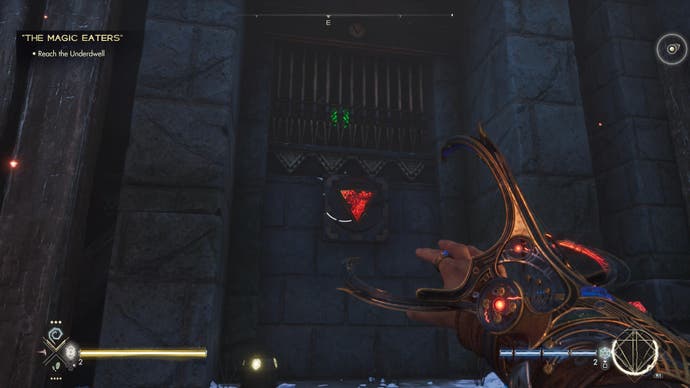
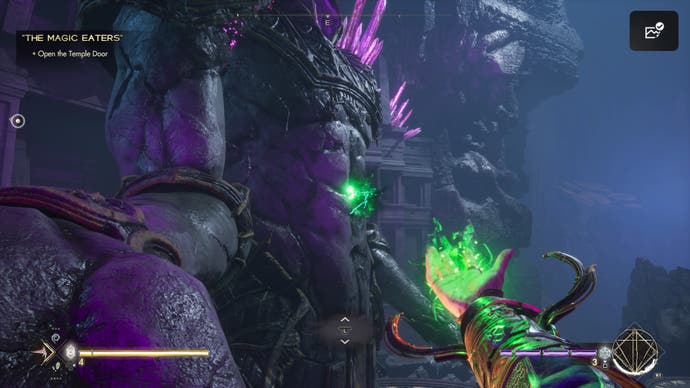
Between not-great combat and endless tat boxes and hit-and-miss platform-puzzling, it's cutscene time. There's a borderline heavyweight cast here. Gina Torres really is giving it everything, demanding you call her sir and hitting every Rasharn and Sandrakk and Pentacade with total Ikora Rey commitment. There are, dare I say it, some quite funny one-liners - including a cracking smash-cut deployment of "Five Years Later", and a decent turn from Antonio Aakeel as posho Green Magni Devyn - and between them all we almost get somewhere. There's a likability to the lameness that you only get from this specific kind of second-tier DC movie patter, where through the gaps left by the usual by-the-numbers guff you can feel a few writers trying things, and no shortage of sincerity across the team. Behind all of this, meanwhile, is lore at least partially whipped up by none other than Michael Kirkbride, the man behind the grand backstories of The Elder Scrolls: Morrowind and more. His involvement here, however, is really one that amounts to the ultimate test of auteur theory, because Immortals of Aveum's world must surely be one of the naffest in games.

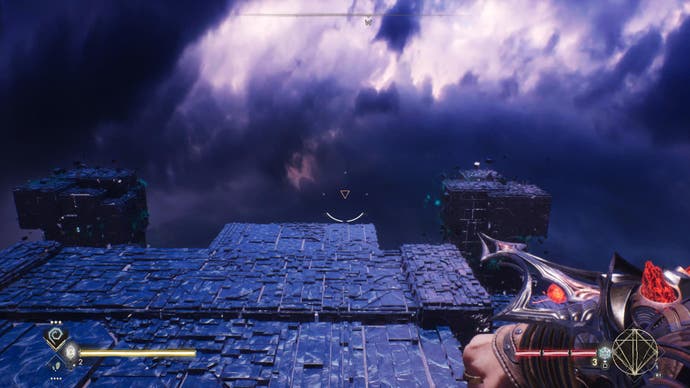
There are some easy guesses to be made about where things might've gone wrong: Bethesda Game Studios in the year 2000 was likely a very different creative environment to one at an EA-published developer in 2023, for instance. But be it the difference in circumstances or the fact that there might only be so many stories about weird giant deities and world-eating rifts you can extract from a man before they start to get a little sludgy, it doesn't come together here. My lasting impression of Immortals of Aveum's world was that it felt like a fake one, dreamt up in five minutes for a video game some brat briefly name checks in an episode of The Sopranos, before Tony tries to play it with one hand and succumbs to another breakdown.
In fact, I'm afraid that's the takeaway from Immortals of Aveum as a whole. There are a few weirdly interesting ideas here - dangling from magic grind rails called Leylines, Bioshock Infinite style, to travel between areas for instance; that's kind of neat? Maybe?! And The Elder Scrolls lover in me still wants to say that, actually, that giant deity is still cool. But they're dotted through at just the right frequency to feel like oddities, rather than moments of ambition.
Aveum as a whole feels like the usual collection of ideas from elsewhere, brought in because, hey, that other game I like has it, only the impossible lameness of characters like Jak-with-just-a-K, a walking cliché with an undercut (someone literally calls him "haircut"!), and the blandly grumpy commander Zendara or sassy communist Kenzie, contrive to take it down a notch from there. As does the churn of its arrhythmic combat, the momentum-sapping puzzles, and the tidal waves of expository lore. It's prevented from total disaster by a kind of earnest energy - a total commitment to the bit - that makes it hard to aggressively dislike. As much as it's tempting to see Immortals of Aveum as just a game out of time - and as hard as it is to think of an era where I could ever say it would be worth yours - there's something salvageable here. Buried deep down beneath layer upon layer of +17 Armor bracelets and one-liner cheese is an honest attempt to do something new-ish. It's just not a particularly successful one.
